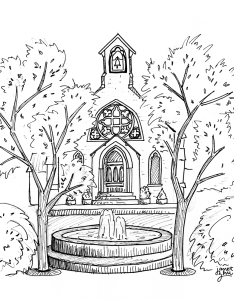
Now that the add/drop period has come to a close, we enter a different phase of the semester. The slow, “Georgetown 3-4-5” start is reaching its finale (we had three days of class the first week, four days this week and will have five full days next week). Ready or not, we are settling into the regular rhythm of study and activities that will keep us busy until Thanksgiving.
Over my years as a student and professor, I’ve learned that one of the keys to success — and to really thriving at Georgetown — is establishing a few habits during these coming days. There can be a temptation to drift and float until the first papers and tests come along, but if you begin now, you will find yourself more engaged, better prepared and even happier for the rest of the semester. So, speaking as a Jesuit and a professor, here are my six habits of thriving Hoyas:
1. Say something in class this week.
I have found that if students say something in my class during the first two weeks, they generally continue to be active participants throughout the whole semester. They lean forward in their chairs, listen better to their classmates and they often perform better on tests and papers. So step out of your comfort zone and set the pattern now of speaking up in class.
2. Go to office hours.
Georgetown has outstanding faculty, and you have a unique opportunity to get to know them. Start now, and go back regularly. Be sure to respect their time by signing up in advance and coming prepared with a question or idea you would like to discuss. The relationship you develop with your professor can be the foundation for a job as a research assistant, letters of recommendation, thesis or major or career advising or even a lifelong friendship. I still keep in touch with my undergraduate adviser, and he has been one of the most important influences on my life.
3. Find others with whom you can study.
I often tell students that they will likely learn as much, if not more, from their fellow students as from their professors. Some of this happens informally with late-night conversations in the common room. But it helps to establish a regular group with which you can discuss ideas from lecture, edit each other’s papers and help one another review for exams. Set up a study group or find a study partner now, even if it’s just someone to go to Lau with; having another person involved will help hold you accountable for keeping up with your reading and progress in your courses.
4. Pay attention to your body.
In an environment as exciting and interesting as Georgetown, we can become so engrossed that we neglect the most basic needs of our bodies. Sleep is often the first thing to be sacrificed. Sometimes we find ourselves skipping meals because we feel busy, stress-eating when we are under pressure or giving up exercise because it would take too long. Make a commitment now — maybe even putting it in your calendar — to a healthy schedule that embodies our ideal of cura personalis, with a mix that works for you of sleep, healthy meals and regular exercise.
5. Engage Georgetown’s Jesuit values, especially as they find expression in questions of faith, meaning and service.
Spend at least five minutes a day — maybe on a bench on Healy Lawn, in Dahlgren Chapel or gazing out on the Potomac — considering the nature and purpose of this “community in diversity,” which embraces the call to be “women and men for others.” Sign up for a retreat, attend a religious service or go to a talk on Georgetown’s identity, history and mission. Push yourself to go deeper than just the buzzwords and banners; ask how our values are making you different, today, in your classes, your friendships and your commitment to a life pursuing truth, integrity and justice.
6. Take a Sabbath.
A recent graduate told me that after an exhilarating but exhausting first year on the Hilltop, she made a decision to take a reflective day off every week of her remaining Georgetown years. In a concession to the busy life we all maintain, it was an 8-hour Sabbath, but it still made a powerful difference in her life. She usually took it Sunday, which allowed her time to connect with her faith community, as well as to rest, exercise, read for pleasure and enjoy unhurried time with friends. When things got busy, her Sabbath helped bring balance back to her week, and it reminded her that her life is about something much bigger than the latest paper or test. Most importantly, it made her grateful for this unique, blessed experience.
Habits help us become the people we want to be. Now is the time to set the patterns that will allow you, and our entire community on the Hilltop, to become the people we are called to be in the coming semester.
 Fr. Matthew Carnes, S.J., is an assistant professor in the government department. He is one of the alternating writers for AS THIS JESUIT SEES IT … which appears every other Friday.
Fr. Matthew Carnes, S.J., is an assistant professor in the government department. He is one of the alternating writers for AS THIS JESUIT SEES IT … which appears every other Friday.



















